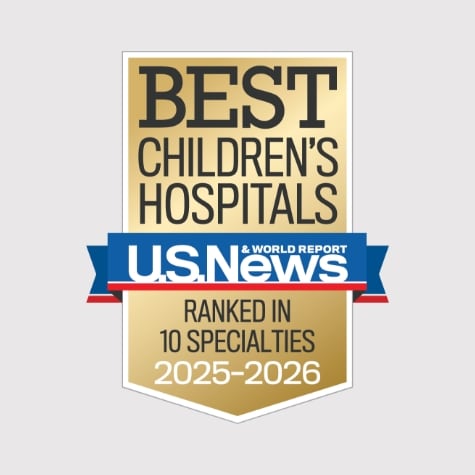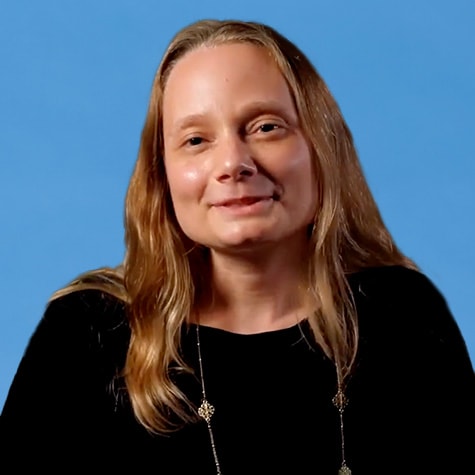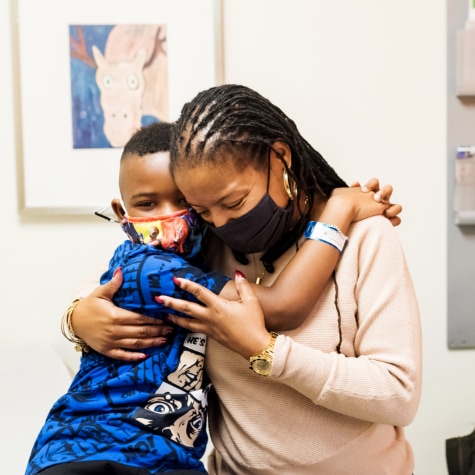Hematology/Oncology Fellowship
At the Aflac Cancer and Blood Disorders Center of Children’s Healthcare of Atlanta, we offer three-year pediatric hematology/oncology fellowships in collaboration with Emory University School of Medicine. Our program is one of the largest pediatric hematology/oncology training programs in the country and the premier program in the Southeast.
Additionally, our Pediatric Hematology/Oncology Fellowship Program offers:
- Blood and Marrow Transplant (BMT) and Cell Therapy Fellowship Program
- T32 Hematology Training Program
- Pediatric Neuro-Oncology Fellowship Program
- Survivorship Fellowship Program
The Aflac Cancer and Blood Disorders Center provides advanced diagnostic and clinical care, educational programs, psychosocial support, and innovative treatment and research options for children and young adults.
The Aflac Cancer and Blood Disorders Center is:
- One of the leading childhood cancer centers in the country, according to U.S. News & World Report.
- Among the largest pediatric hematology/oncology programs in the country, employing approximately 135 faculty members.
- One of the first established National Institutes of Health (NIH) K12- and K30-sponsored clinical research training facilities.
- An active participant in numerous Children's Oncology Group (COG) clinical trials, consortium trials, and local investigator-initiated studies providing vast options for patients to participate in state-of-the-art treatments, the Aflac Cancer and Blood Disorders Center annually ranks among the top centers nationally for COG clinical trial enrollment.
- A member of the COG Phase I consortium—one of only 21 centers in the country and one of three in the Southeast.
- Generating direct costs of $40.4 million in extramural research funding in 2024.
- The largest comprehensive pediatric sickle cell disease program in the country and among the top five hemostasis and thrombosis programs nationally.
- The largest single-center experience in the country for matched-sibling transplants for sickle cell disease.
Population served
As one of the largest childhood cancer and blood disorders centers in the country, you’ll gain exposure to a high volume and variety of cases. We care for more than approximately 500 newly diagnosed cancer patients each year and follow more than 2,000 patients with sickle cell disease, hemophilia and other blood disorders. In addition, we have performed more than 1,000 BMTs since our program’s inception, and we follow more than 2,225 survivors through our Cancer Survivor Program.
Children’s Healthcare of Atlanta and Emory University: A historic partnership of pediatric excellence

In 1956, the Board of Trustees for both Emory University and Egleston Hospital signed an agreement to make Egleston a first-rate teaching hospital
Children’s is one of the largest freestanding healthcare systems in the country. Emory is one of the nation’s leading research universities. Together, the two share a passion for pediatric innovation and advancements. In 1956, Children’s Healthcare of Atlanta’s Egleston Hospital and Emory University first established a pediatric teaching relationship. This relationship has developed to facilitate leading-edge pediatric research, training and innovation.
Children’s and Emory University School of Medicine partner together on pediatric residency and fellowship training programs as well as the management and execution of clinical trials. Discoveries in Emory’s research laboratories are translated into lifesaving treatments at Children’s. Emory and Children’s share a unique employment agreement; more than 400 physicians hold titles at both independent institutions.

National Honors from U.S. News & World Report
Children’s ranks among the nation’s top pediatric hospitals on the U.S. News & World Report list of “Best Children’s Hospitals.” The report ranks hospitals for excellence in outcomes, program structure and national reputation in 10 pediatric specialty areas.
Our Awards
Why Atlanta?
In addition to our unique neighboring pediatric partners, Atlanta is full of diverse communities, walkable neighborhoods, a thriving arts and culture scene, and plenty of green spaces and sunny weather—it’s pretty easy to fall in love with our charming city.
Make Atlanta HomeOur fellowship program leaders include:
- Katie Sutton, MD, Program Director
- Dan Wechsler, MD, PhD, Co-Director
- Gary Woods, MD, Associate Director
- Gary Lindsay (gary.lindsay@emory.edu), Senior Program Coordinator
Learn more about our pediatric hematology/oncology team and their interests.
First-year Fellows
Catherine Blackburn, MD, MPH
College: University of South Florida
Medical School: University of South Florida Health Morsani College of Medicine
Residency: University of Virginia
Mary Blumenfeld, MD
College: Bryn Mawr College
Medical School: Thomas Jefferson University
Residency: Nemours Children’s Hospital (DE)
Ronak Dave, MD
College: Williams College
Medical School: Augusta University/University of Georgia Medical Partnership
Residency: Emory University
Hira Hasan, MD
College: Louisiana State University
Medical School: Louisiana State School of Medicine – New Orleans
Residency: Vanderbilt University
Brooke Landry, DO, MSc
College: University of Florida
Medical School: Nova Southeastern University Kiran C. Patel College of Osteopathic Medicine
Residency: Broward Health Medical Center Salah Foundation Children’s Hospital
Breyonna Maddox, DO
College: Barry University
Medical School: Nova Southeastern University Kiran C. Patel College of Osteopathic Medicine
Residency: Nicklaus Children’s Hospital
Second-year Fellows
Shana Burstein, MD
College: Haverford College
Medical School: Albert Einstein College of Medicine
Residency: Children’s Hospital at Montefiore
Beth Byers, MD
College: Auburn University
Medical School: University of Alabama at Birmingham
Residency: Emory University School of Medicine
Peter Carlson, MD, PhD
College: University of Washington
Medical School: University of Wisconsin
Residency: University of Washington
Marina Girgis, MD, Completing Med/Peds Adult year
College: University of Virginia
Medical School: Wake Forest University
Residency: Vanderbilt University
Myrto Skafida, MD
Medical School: University of Patras
Residency: SUNY Downstate
Martha Stewart, MD
College: James Madison University
Medical School: University of Virginia
Residency: UPMC Children’s Hospital of Pittsburgh
Third-year Fellows
Ugo Agbakwuru, MD
College: University of Michigan
Medical School: Michigan State University
Residency: Washington University School of Medicine/St. Louis Children's Hospital
Akshaya Arjunan, MD
College: University of Pittsburgh
Medical School: University of Pittsburgh School of Medicine
Residency: UPMC Children’s Hospital of Pittsburgh
Toni Chanroo, MD, MPH
College: Johns Hopkins University
Medical School: University of Miami School of Medicine
Residency: Baylor College of Medicine
Sukjoo Cho, MD
Medical School: Hallym University College of Medicine (The Republic of South Korea)
Residency: University of South Florida
Zuri Hudson, DO
College: Georgia institute of Technology
Medical School: Lincoln Memorial University – DeBusk College of Osteopathic Medicine
Residency: Children’s Mercy Hospital (Kansas City)
Nabil Saleem, MD
College: Bates College
Medical School: Tufts University School of Medicine
Residency: Emory University School of Medicine
Fourth-year Fellow
Joshua Muñiz, MD, Med/Peds 4th Year Fellow
College: Columbia University
Medical School: University of Illinois College of Medicine
Residency: Baylor College of Medicine
I chose Emory because of its dedication to support diverse career paths that fellows pursue. The program has clear track records of advocating various trajectories of the fellows, including but not limited to bench research, clinical trials, bioinformatics, and survivorship. In addition, its clinical abundance in both hematology and oncology build a solid foundation for the growth of fellows. The program leadership listens with open ears and follows up diligently. They are always willing to make good changes, resulting in key changes in the program structure such as night calls. - Sukjoo Cho, MD, Class of 2026
“I knew after my interview day that Emory/Aflac would be the best place for me to train for a variety of reasons. This is one of the largest programs in the country that offers comprehensive training in both hematology and oncology which makes for an unmatched clinical learning experience. Specifically, as someone interested in hematology, learning at a center with a high volume of patients with sickle cell, bleeding/coagulation disorders, hemophilia, RBC disorders, etc has been valuable. Moreover, despite the high volume, there is an importance placed on fellow education and creating a protected learning environment which has allowed me to grow and thrive as a trainee in a stress-free manner. Faculty are committed to our career development and helping us learn, and I look forward to continuing my training surrounded by this supportive community!” - Akshaya Arjunan, MD, Class of 2026
"I chose Emory because of the balance between the the hematology and oncology training. Most programs tend to place focus on one or the other, but Emory trains world-class hematologists AND oncologists. Our unique position in the region means we see a tremendous breadth of pathology, and our research infrastructure fosters early academic success." - Will Mitchell, MD MS, Class of 2025
“Emory and Children's Healthcare of Atlanta's embraces many different paths for career growth. As a former computer scientist trying to build a research niche within informatics, I was met with not only interest but also excitement. Emory University's large capacity for research, wealth of computational resources, as well as it's close collaborative ties with Georgia Tech makes this an ideal place to grow as an informaticist. It doesn't hurt either that this children's hospital is a national leader in hematology/oncology.” - Frank Chien, MD Class of 2023

Pediatric Hematology/Oncology Fellowship Highlights
As one of the largest pediatric oncology and hematology programs in the country, the Aflac Cancer and Blood Disorders Center offers a three-year fellowship in collaboration with Emory University.
Watch Video
Why Children's?
We manage one million patient visits annually at three hospitals, Marcus Autism Center, the Center for Advanced Pediatrics, urgent care centers and neighborhood locations.
Learn moreOur goal is to train academically oriented hematologists and oncologists who will be involved in a lifetime of excellence in pediatric patient care, teaching and research. Our program sees some of the country’s largest pediatric patient volumes, exposing fellows to more educational cases and greater research opportunities.
Our Pediatric Hematology/Oncology Fellowship Program has received full accreditation by the Accreditation Council for Graduate Medical Education (ACGME). The Aflac Cancer and Blood Disorders Center of Children’s is affiliated with Emory University, which is ranked among the top research medical schools in the country by U.S. News & World Report.
There is funding for six new fellows each year to be fully supported throughout the three-year program. Tuition for the Masters of Science in Clinical Research (MSCR) Program is also covered for fellows who are pursuing clinical research. Additional Masters and PhD level programs may also be covered based on applicant goals and interests. Additional years of research training are available for highly qualified candidates.
The Aflac Cancer and Blood Disorders Center receives funding for its fellowship program from the St. Baldrick’s Foundation and CURE Childhood Cancer. These organizations encourage promising new medical professionals to pursue pediatric cancer research as a specialty.
First-year fellows spend a majority of their time in clinical rotations. Second- and third-year fellows primarily spend their time in various research and educational activities. Each fellow maintains a continuity clinic one day a week for the entire three years. The Aflac Cancer and Blood Disorders Center also offers an optional fourth year of fellowship to continue to hone research skills, as well as the opportunity for clinical fourth year fellowships in neuro-oncology, bone marrow transplant and survivorship. Select fellows who are trained in both pediatrics and internal medicine may pursue training in adult hematology or medical oncology through the Emory University Winship Cancer Institute and will be considered on an individual basis.
Below is a snapshot of our Pediatric Hematology/Oncology Fellowship Program:
Clinical rotations—first year
- Inpatient/outpatient oncology (three months)
- BMT—inpatient/outpatient (two months)
- Inpatient/outpatient hematology (three months)
- Neuro-oncology—inpatient/outpatient (one month)
- Subspecialty clinics rotation (one month)
- Research exploration (one month in total, divided into two-week blocks)
- Other experiences throughout the year, including radiation oncology, hematopathology, cytogenetics, transfusion medicine
- Outpatient/subspecialty experiences, including hemophilia clinic, vascular anomalies clinic, stroke clinic, cancer predisposition clinic, cancer survivorship clinic, developmental therapeutics clinic, bone marrow failure clinic, immunohematology clinic and women's bleeding disorder clinic
Research—second and third years
Second- and third-year fellows are offered a variety of opportunities in clinical, translational and basic research. These opportunities are available at the Aflac Cancer and Blood Disorders Center, throughout the Emory University system and beyond.
We are devoted to training physician-scientists seeking careers in academic pediatric hematology/oncology, whether in clinical or laboratory-based research. In addition to research opportunities within the Aflac Cancer and Blood Disorders Center, fellows may collaborate with faculty at the Winship Cancer Institute of Emory University, Emory School of Public Health, Georgia Institute of Technology, Yerkes National Primate Research Center and Centers for Disease Control and Prevention (CDC).
We offer a clinical research track for fellows interested in careers as clinical investigators. Fellows interested in clinical research are encouraged to apply for the Emory University MSCR Program and to gain exposure through the myriad of ongoing clinical trials available within the division.
In conjunction with the Emory University Laney Graduate School, we also offer a unique pathway for pediatric hematology/oncology fellows to pursue a PhD during the research portion of their fellowship. Opportunities for pursuing doctorate level research exist within the Cancer Biology Program of the Laney Graduate School and the Wallace H. Coulter Department of Biomedical Engineering at Emory University and Georgia Institute of Technology. The goal of this unique program is to train academically oriented pediatric hematologists and oncologists to be involved in a lifetime of excellence in patient care and teaching, while also becoming research scholars with in-depth scientific training, culminating with a PhD in a biomedical discipline.
We also create an individualized scholarship oversight and mentoring committee to guide fellows through their fellowship research experience.
Research—optional fourth year
An additional year of training is strongly encouraged and available with funding to all fellows. The typical fourth year is approximately 85% devoted to expanding on a fellow’s research and allows the fellow to increase competitiveness in garnering future career development awards or other grants for young investigators. Approximately 15% of the time is allotted for clinical exposure in the fellow’s area of interest as senior associate or instructor-level faculty. Additional clinical fourth-year fellowships are also available.
On-call schedule
Night call takes place from home. Fellows occasionally return to the hospital to evaluate newly diagnosed or extremely ill patients. The frequency of night and weekend call decreases significantly throughout the three years to allow senior fellows the ability to focus on their research.
Didactic schedule
A variety of educational meetings are offered in addition to structured teaching, ethics and research overview courses throughout the year. Fellows participate in weekly tumor boards and monthly academic half days.
Additional benefits of the program
Fellows receive three weeks of vacation each year. Each fellow has an educational stipend, which may be used for meetings, journals or other educational expenses. Senior fellows attend additional scientific meetings based on research presentations.
In order to be considered for our Pediatric Hematology/Oncology Fellowship Program, applicants must complete an accredited three-year pediatric residency in North America before the start of the program. International medical graduates are welcome and encouraged to apply.
Children’s welcomes and appreciates everyone, regardless of gender or gender identity, age, race, ethnicity, socioeconomic status, sexual orientation, political affiliation, religion, health status or family composition. Our goal is to be a place where people feel valued for their professional and personal contributions, and to be a model for standing against discrimination, and standing for diversity and inclusion.
To apply
We use the Electronic Residency Application Service (ERAS) to process all fellowship applications.
How to apply:
- Visit the ERAS website.
- Select “MyERAS.”
- Note your Association of American Medical Colleges (AAMC) ID and self-created password for future access.
Contact Gary Lindsay (gary.lindsay@emory.edu), Senior Program Coordinator, with questions.
Application requirements checklist
Applicants must submit:
- Curriculum vitae (including academic honors, membership in organizations, research experience and extracurricular activities)
- Three letters of recommendation, including:
- Faculty member from a division of hematology/oncology
- Faculty resident advisor or residency program director
- A professional of your choosing (if significant research involvement, letter from research mentor)
- Copy of dean’s letter and evaluation
- Medical school transcript
- Personal statement, including a description of previous research and clinical experience, reason for interest in a career in pediatric hematology/oncology, and career goals
- Copies of United States Medical Licensing Examination (USMLE) scores, Step 1 and Step 2 only
- Immigration visa copy (if applicable)
- Educational Commission for Foreign Medical Graduates (ECFMG) certificate (if applicable)
- Passport-style photograph
Gary Lindsay (gary.lindsay@emory.edu), Senior Program Coordinator
Contact Us Gary Lindsay

